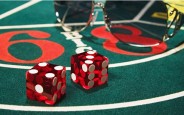What is Luck?

In our day to day life, and especially in the incredibly hectic 21st century, we all rely on luck, whether we realize it or not. From straight forward day to day things like getting to work on time, There are occasions when we here at ReadyBetGo want to bring you interesting facts about the gambling industry When something catches our eye, we will publish it for your enjoyment.
There are occasions when we here at ReadyBetGo want to bring you interesting facts about the gambling industry When something catches our eye, we will publish it for your enjoyment. 
or making money at online casinos, all the way through to huge life choices like a new career or moving home.
The Oxford dictionary defines Luck as “Success or failure apparently brought on by chance rather than through one's own actions”. When we experience what we perceive to be luck, we feel we have beaten random chance, and that our ability to control our fate has somehow overcome natural chaos. We may also feel lucky when we experience a positive outcome from a poor decision or a dangerous incident. Without our intervention, things happen to us and around us, and we explain the near misses as being down to fortune, or good/bad luck. Around the globe, there are hundreds of symbols, omens and representations for luck. One of the most common and well used symbols is the four leaf clover. Commonly tied to Celtic history, it has been used for everything from Cereal Mascots, Sports logos and more commonly even tattoos. The four-leaf clover is a fairly unique version of the more commonly found three-leaf clover. According to tradition, these clovers bring good fortune as each leaf is believed to represent something: the first is for faith, the second is for hope, the third is for love, and the fourth is for luck.
In Asia, especially China, different numbers can represent different meanings, and it’s said that the number 8 is the luckiest of them all. This is similar in many eastern countries due to the word’s similarity in pronunciation to the word for wealth or fortune. The clear popularity of the number was evident when Beijing hosted the 2008 Olympics, beginning at 8.08pm on August 8th. Another Eastern symbol is the Maneki-neko, literally translated to beckoning cat, a Japanese figurine or talisman often thought to bring good luck to its owner. The figure depicts a small cat with its paw up, waving, often coloured white, black, Gold or occasionally red. They are commonly mistaken to be Chinese in origin due to their popularity with Chinese merchants and tourists.
A study published in 2003 by Richard J. Wiseman, a Professor of the Public Understanding of Psychology at the University of Hertfordshire, discovered that people considered “lucky” scored considerably higher on extroversion. They smile twice as often and engage in more eye contact. Their sociability, Wiseman explains, helps them increase their likelihood of a lucky opportunity because they meet more people, connect better, and maintain relationships. No matter where you stand on the concept of luck, or cosmic intervention, there’s no denying some people are simply luckier than others.
